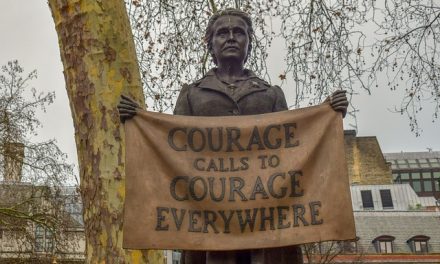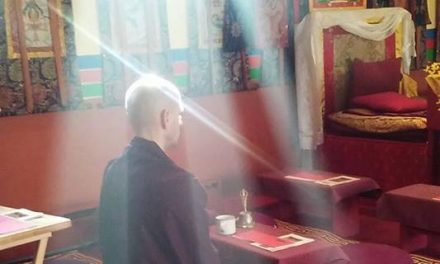
I couldn’t find satisfying answers to these questions when I was growing up as an evangelical Christian, and when I left the Christian faith, I didn’t think much about the story or its theological repercussions. That said, walking the Buddhist path led me back to this story, allowing me to view it from new and interesting angles. In fact, when I looked at the story of Adam and Eve through a Buddhist lens, it stopped being a cautionary tale of crime and punishment. Instead, it became a coming-of-age story, which filled me with hope and inspiration.
By Sensei Alex Kakuyo
One of the first bible stories that I learned involved Adam, Eve, and the garden of Eden.
As the story goes, Adam was the first man, created by God from the dust of the earth. And Eve was his wife, created from Adam’s rib in order to serve as his help-mate.
The garden of Eden was a paradise, designed by God to provide for their every need. Adam and Eve were charged with caring for the garden. They named the animals, they cared for the plants, and they enjoyed each other’s company. There was only one rule. God proclaimed that they could eat the fruit of every tree. However, they must never eat fruit from the tree of life, which grew in the center of the garden.
God warned Adam and Eve that if they broke this rule, they would die.
The couple lived in harmony until one day a serpent entered the garden and spoke to Eve, telling here that if she broke God’s commandment and ate from the tree of life, she would not die. Instead, she would gain knowledge of good and evil.
Eve ate the fruit of the tree, and afterwards she convinced Adam to do the same. However, when they ate the fruit, they realized they were naked, and they felt ashamed. The first man and his wife covered their naked bodies with leaves and hid from God when he entered the garden. This is described in the book of Genesis as follows:
Then the man and his wife heard the sound of the LORD God as he was walking in the garden in the cool of the day, and they hid from the LORD God among the trees of the garden. But the LORD God called to the man, “Where are you?” He answered, “I heard you in the garden, and I was afraid because I was naked; so I hid.
Genesis Chapter 3 Verses 8-9 NIV
When God realized that Adam and Eve disobeyed him, that they ate fruit from the tree of life, he banished them from paradise. However, before they left he made the following proclamations. He told Eve that she would experience great pain when she gave birth. And he told Adam the following:
To Adam he said, “Because you listened to your wife and ate fruit from the tree about which I commanded you, ‘You must not eat from it,’ “Cursed is the ground because of you; through painful toil you will eat food from it all the days of your life. It will produce thorns and thistles for you, and you will eat the plants of the field. By the sweat of your brow you will eat your food until you return to the ground, since from it you were taken; for dust you are and to dust you will return.
Genesis Chapter 3 Verses 17-19 NIV
After Adam and Eve left the garden, God placed an angel at the East gate to ensure that they could not come back, and the first man and first woman went out into the world to make a life for themselves. The rest, as they say, is history.
This story was formative for me as a child; it shaped the way I viewed the world, and how I saw my place in it. It seemed like my humanity made me dirty, that I was the inheritor of an original sin. It also raised questions like:
If God did not want Adam and Eve to eat from the tree of knowledge, why did he put it there in the first place?
Why is it a bad thing for people to have knowledge of good and evil? Why is the entire world punished for the actions of two people?
I couldn’t find satisfying answers to these questions when I was growing up as an evangelical Christian, and when I left the Christian faith, I didn’t think much about the story or its theological repercussions. That said, walking the Buddhist path led me back to this story, allowing me to view it from new and interesting angles.
In fact, when I looked at the story of Adam and Eve through a Buddhist lens, it stopped being a cautionary tale of crime and punishment. Instead, it became a coming-of-age story, which filled me with hope and inspiration.
To understand how this happened we must start by looking at the garden itself. The bible does not give much detail as to exactly what was in the garden, how it grew, or the exact dimensions of the space. But we are given some information. We know that there are plants and animals in abundance, that the climate was amicable enough that Adam and Eve could live comfortably without clothes.
In short, the garden was the ideal environment for human existence; a place where their every need was met with little to no effort. In Buddhism, we have a word for a place like this. It’s called a Pure Land. A Buddhist Pure Land is a place that’s ruled over by a Bodhisattva and it’s designed to be the ideal place to realize enlightenment.
In the Vimalakirti Sutra, it’s suggested that there are an infinite number of Pure Lands in the universe, and each one of them differs based on the spiritual needs of their inhabitants. For example, the Tathagata of Wonderful Fragrances is responsible for a Pure Land where delicious foods and wonderful smells are used to rid inhabitants of their defilements so that they realize enlightenment.
It’s clear from the biblical account that the Garden of Eden was the ideal place for human habitation; designed to meet every material need of the young couple. But if it was meant to be perfect, how did everything go wrong?
From the Buddhist perspective, the answer to this question is found in two words; ignorance and desire.
In the story, these two objects are represented metaphorically by the serpent and the forbidden fruit. The snake represents ignorance; ignorance of our true nature, which is Buddha. And ignorance of the true nature of the world, which is also Buddha.
As humans, when we lose sight of these things, we lose sight of the small joys we experience in daily life (a hot cup of coffee, a pet who wants to snuggle, a supportive spouse), and we have doubts. We begin to wonder if “this” is really all there is to life, regardless of how good or bad “this” actually is.
For example, take the life of Siddartha Gautama, the man who become the historical Buddha.
He grew up in a palace, under the protection of his father. His every need was met, and he was destined to rule over a great kingdom. But because he was ignorant of his own true nature, he had doubts. And all of the pleasures of palace life couldn’t bring him happiness.
He had to leave the palace and experience the suffering of the world for himself before Buddha could find lasting peace Similarly, Adam and Eve were born in a literal paradise. There were no noisy neighbors, no pollution and no medical bills. They had no responsibilities beyond caring for the garden and each other. But it wasn’t enough.
Their ignorance led to doubt, and their doubt led to desire. The danger of this chain of events can be found in the four noble truths of Buddhism, which state the following:
Life is Suffering
Suffering is cause by desire
The way to end suffering is to end desire
The way to end desire is the Noble Eightfold Path
For the time being let’s focus on the second one, which states, “Suffering is caused by desire.” It’s important to note that desire is not a bad thing in and of itself.
When we’re hungry, we have a desire to eat, and it would be foolish to try and change that. However, it would be equally foolish to not realize that desires have consequences. And there are times in life when the price of our desires is more than we’re willing to pay.
In Buddhism, we walk the “middle-way” between desire and the consequences of desire.
We examine our wants individually, study the karma associated with them, and determine if the expected benefit is worth the suffering they may cause.
If the numbers don’t add up, if our desires will give us momentary happiness and a lifetime of pain, we let them go. When we look at the tree of knowledge from this view point, it stops being a trap, and it transforms into a teaching tool.
Adam and Eve were given a choice; be content with their happy life in the garden, or desire something more. They chose the latter, and they suffered as a result. And isn’t that the choice we’re all given? When we drive to work, when we sit with our spouse at dinner, when stretch out on the couch after a long day, don’t we decide if we’ll be present in that moment or daydream about ways to make it better.
Don’t we decide if we’ll live contentedly in the garden of our lives or surrender to the desire for something more? And if the answer is, “yes,” why do we choose the latter, and the suffering that goes with it?
Like the Buddha, Adam and Eve had to leave the safety of their home, and explore the wilderness to find answers to these questions.
Upon leaving the garden, some people think they were cursed for their disobedience. But this is incorrect. In fact, Genesis 3: 17-19 states that the ground is cursed because of their actions. It goes on to say Adam will have to grow his own food, and deal with thorns and thistles in order to survive. In short, God is telling Adam that he must become a gardener.
What gardener hasn’t felt like the ground was cursed, like the earth itself was fighting against them? When striped cucumber beetles ate their squash, when cabbage moths tore holes in their collard greens, when blight destroyed their potatoes what gardener didn’t despair?
But the experienced gardener knows that the same ground, which produces pestilence and disease also gives space for crops to grow. If they’re skillful in their application of pesticides and fertilizers, they can maximize the latter while minimizing the former.
This is the instruction that God gives the first man and first woman. He helps them understand that the same ignorance that caused them to lose the garden of Eden will make them see the earth as an enemy. That won’t change until they choose a life of contentment instead of a life of desire.
The existence of that choice is why this story is a hopeful one.
Each of us can return to paradise any time we like. We can let go of our desires and express gratitude for the food, the clothing, the shelter that we’ve been given. In doing so we can trade our lives of suffering for lives of peace.
Namu Amida Butsu
Did you like this post? You might also like:
What it Means to Be the Change
Comments
- Saving the World is Hard (But We Can Start by Making the Bed) - January 9, 2024
- No Shortcuts to Inner Peace - November 28, 2023
- Why I am Not a Minimalist (anymore) - November 8, 2023





Trackbacks/Pingbacks